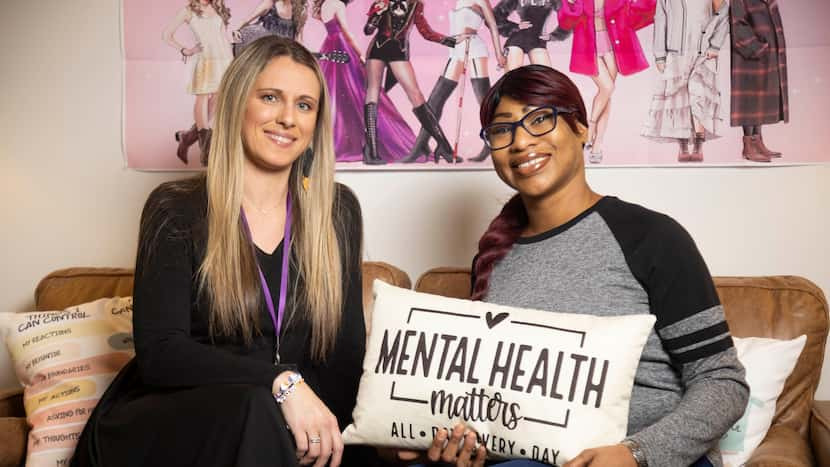Dallas Morning News readers offered a lot of feedback on my column last month about former Dallas County DA Susan Hawk’s road to healing from mental illness.
They marveled at Hawk’s courage and cheered her recovery. They shared her story with others in need of hope. They wrote about their own struggles, to which I responded with some of mine.
One email, from a woman who said she has dealt with depression her entire life, also included hard questions.
This reader had found Hawk’s story inspiring and powerful. But what about those who don’t have financial resources, access to services or family support?
What about the single mom experiencing suicidal thoughts and barely able to make the house payment and get her kid to school? Or the health care staffer traumatized over the loss of a baby and faced with the choice of returning to her job or being fired?
Reminding the emailer about the list of mental health providers we published with the Hawk column seemed an inadequate response. She’s right. Help is scarce and often no appointments are available, especially for those hovering around the poverty line.
After more reporting, I’ve found a better answer for those who don’t know where to turn: the Richardson-based Network of Community Ministries. Its newly created mental health initiative is a potential lifesaver for neighbors — and a challenge to other nonprofits that doing this difficult work is possible.
Framed on the wall at Network are the original notes from its 1985 organizational meeting. After the “to do immediately” list — provide food and clothing, then housing and job assistance — was the founders’ aspiration of one day offering counseling services.
“I’m not sure what the roadblocks were for 38 years,” President and CEO Abbie Kauffman told me, “but I took over in September 2022, and we began to explore ways to make this happen.”
A year later, with a big financial assist from the city of Richardson, Network began offering free and unlimited counseling to neighbors struggling to make ends meet. Access to the mental health staff comes with no sliding scale for fees and no maximum number of sessions.
This barrier-free help, offered alongside other vital wraparound services, is extremely unusual — if not one of a kind — in North Texas. Network primarily serves neighbors in the 14 zip codes that make up the Richardson ISD, but the staff tries to ensure anyone who reaches out to them finds good mental health help.

One of Network’s neighbors is Tiffany Gipson, who came to the nonprofit for help with the trauma she experienced as a witness to the final moments of the mass shooting at Allen Premium Outlets in May.
Gipson was working her shift that day at Fatburger when a crowd of people ran past the restaurant. Her next memory is of the gunman, who had just killed seven people, bleeding out after a police officer shot him on the nearby sidewalk.
“It was a very traumatic experience because it happened right in front of my face,” Gipson told me.
In the aftermath, Gipson, who already suffered from anxiety and depression, received a referral for mental health help. When she called that agency, she was told there wasn’t a spot for her.
Gipson suffered in silence for months until a hospital social worker told her about Network. She began seeing therapist Holly Packer as soon as the program launched in September.
“Holly has given me a lot of hope,” Gipson said, “and it’s made a world of difference for my mental health.” With a list of coping skills she keeps handy, Gipson has been able to take another job and start getting her life back together.
Packer told me she most admires Gipson’s resiliency and helps her tap into the strengths she already possesses.

Another Network neighbor is Melissa Watkins, whose mental health took a big hit during the pandemic. In a flash, her husband left, she lost her job and her two kids’ schools began remote learning.
“That’s enough to make anybody a little bit mentally unsteady,” Watkins said.
She acknowledged that getting over the hump to seek help is terrifying. “It’s hard to admit to yourself, much less to anyone else, you are struggling, that you have anxiety constantly.”
Once she started looking, she began to fear finding affordable, much less free, mental health help was impossible.
After moving from McKinney to Richardson, she heard from a friend about Network. Now she meets weekly with Packer, and the counseling helps her and, by extension, her two children.
“This program is a gift,” she told me. “I have fewer hard days and I see things more positively.”

Amanda Pels, who joined Network in June as chief strategy officer, is the point person for the mental health operation. She said the difficulties Gipson and Watkins shared are no different than what she hears from all Network neighbors.
“Again and again, it’s ‘I can’t find this anywhere else. It’s unaffordable when I do find it,’” said Pels, a licensed clinical social worker with experience at Parkland Memorial Hospital and CitySquare.
When people are challenged to provide food and housing for their family, they won’t consider spending money on their mental health, she said. That’s why Network offers a barrier-free way to ensure this essential service.
Another piece of Network’s mental health services is the monthly Parent Café, which the nonprofit began hosting in November to build community and provide social support. Isolation is a common concern of many of the neighbors; most who attend Parent Café are also enrolled in counseling.
Network staffers spent part of Tuesday making Taylor Swift-inspired friendship bracelets for the March 21 Parent Café. Participants will pick up their beaded bracelet — each including a word such as smile, brave, fearless or kind — and partner with the other person in the room who has the same wristband.
“Whether they know about Taylor Swift or not, wearing a positive message makes you feel empowered and encouraged,” Pels said.

Building a mental health team as qualified as the one Pels oversees is not cheap. Network’s ability to do so comes out of its strong partnership with the city of Richardson. The city provided start-up money, pledging $200,000 annually for three years.
A matching donation by the Ruth Ann Marmion Charitable Fund enabled the nonprofit to hire a second therapist and, starting at the end of this month, a contract psychiatrist for medication management.
CEO Kauffman hopes Network’s demonstration that this work can be done — and done well — will cause other organizations to take it on. “Bring on just one highly qualified counselor and you can help 15 to 20 people,” she said.
If a nonprofit isn’t ready to take that step, Pels suggests starting with a Parent Café. That’s the place neighbors hesitant about diving in to counseling often want to start.
The Network team also is committed to finding quality help for anyone they can’t serve. “When you’re not sure where to go, go somewhere or call us,” Pels said. “We can get you connected with someone who knows something.”
To learn more about Network of Community Ministries’ mental health services, visit thenetwork.org, email neighbor intake coordinator vbrizuela@thenetwork.org or call 972.234.8880 ext. 133. The nonprofit is open Monday through Wednesday 8 a.m. to 4 p.m. and Thursday 8 a.m. to 7 p.m.










